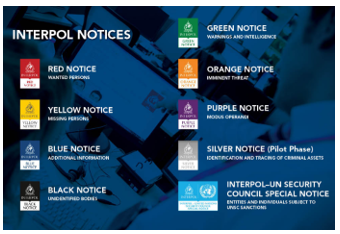Syllabus:
GS2: Statutory, regulatory and various quasi-judicial bodies.
GS2: Important International institutions, agencies and fora- their structure, mandate.
Context: Interpol's Red Notices issued at the CBI's request have more than doubled annually since 2023.
More on the News
- The Lyon-based International Criminal Police Organization (Interpol) had issued 25 Red Notices in 2020, 47 in 2021 and 40 in 2022.
- As per the PTI data, since 2023, the number of Red Notices issued on India's request spiralled with remarkable keenness: 100 notices in 2023, 107 in 2024 and 56 in the first six months of 2025.
- The Blue Notices, through which a country seeks information about a person, have gone up from 47 in 2020 to 68 in 2024 and 82 till now in 2025; Yellow notices, used for seeking details of abductions, disappearances or identity issues, have gone up from one in 2020 to 27 in 2024 and four in 2025 (till now).
- In total, 145 Interpol Notices have been issued in 2025 till now, as compared to 73 issued in 2020. Last year, 208 Notices were issued by Interpol, the data shows.
- The rise in Interpol Notices at India's request is due to deft diplomacy, institutional assertiveness, tech upgrades, and key events like the 2022 Interpol General Assembly and 2023 G20 Summit.
Interpol
- The full name of Interpol is International Criminal Police Organization. It is an inter-governmental organization. It has 196 member countries, and it helps police in all of them to work together to make the world a safer place.
- Headquarters: Lyon, France
- The Interpol General Assembly was held in India in the year 2022 to coincide with the 75th Anniversary of Indian Independence, 25 years after the global confluence of police chiefs was also held here in 1997.
- Normally, each of the 195 member countries gets a chance to hold the annual event on a rotation basis.
- Functioning:
The General Secretariat coordinates our day-to-day activities to fight a range of crimes. Run by the Secretary General, it is staffed by both police and civilians and comprises a headquarters in Lyon, a global complex for innovation in Singapore and several satellite offices in different regions.
In each country, an INTERPOL National Central Bureau (NCB) provides the central point of contact for the General Secretariat and other NCBs. An NCB is run by national police officials and usually sits in the government ministry responsible for policing.
The General Assembly is the governing body and it brings all countries together once a year to take decisions. - Important Notices:

- Red Notice: To seek the location and arrest of persons wanted for prosecution or to serve a sentence.
It is the first crucial step in pursuing the extradition of a fugitive who escaped to a different country to evade the law.
Yellow Notice: To help locate missing persons, often minors, or to help identify persons who are unable to identify themselves.
Blue Notice: To collect additional information about a person’s identity, location or activities in relation to a criminal investigation.
Black Notice: To seek information on unidentified bodies.
Green Notice: To provide warning about a person’s criminal activities, where the person is considered to be a possible threat to public safety.
Orange Notice: To warn of an event, a person, an object or a process representing a serious and imminent threat to public safety.
Purple Notice: To seek or provide information on modus operandi, objects, devices and concealment methods used by criminals.
Silver Notice (pilot phase-starting 2025): To identify and trace criminal assets parked abroad
INTERPOL–United Nations Security Council Special Notice: Issued for entities and individuals who are the targets of UN Security Council Sanctions Committees.
Central Bureau of Investigation (CBI)
- The CBI, which is the National Central Bureau of India, is the nodal agency for India for all Interpol matters.
The CBI’s origins date back to 1941, when the Government of India established the Special Police Establishment to investigate bribery and corruption within the War and Supply Department during World War II.
After the war, the need for a dedicated agency to address corruption among Central Government employees led to the enactment of the Delhi Special Police Establishment Act in 1946.
In 1963, the CBI was officially formed following a resolution from the Ministry of Home Affairs, based on the recommendations of the Santhanam Committee on Prevention of Corruption. - It was subsequently transferred to the Ministry of Personnel, Public Grievances, and Pensions, enhancing its operational framework.
- In 2023, the CBI top brass emphasised on making Interpol engagement seamless and cutting down on the processing time of requests coming from state police, besides building on the negotiations during the General Assembly and G20.
- The agency developed an in-house portal, Bharatpol, operationalised in January, which made the process of Red Colour Notice -- historically mired in paperwork and procedural torpor -- frictionless and cut down the time from an average of six months to three months.
- The results translated in terms of extradition as well, with the CBI coordinating closely with Interpol, as well as state and central enforcement agencies, to secure the extradition or deportation of 134 fugitives since 2020. Of these, 23 were brought back this year alone.

Source: The Hindu
https://www.thehindu.com/news/national/cbi-backed-interpol-red-notices-doubled-since-2023-with-indias-diplomatic-tech-push/article69835972.ece















